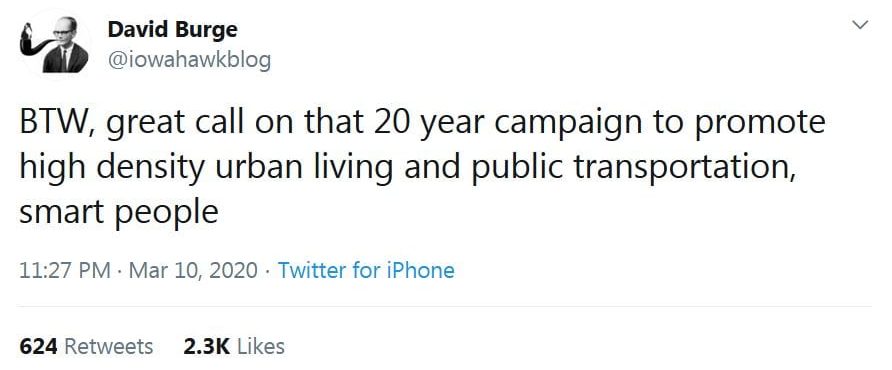THE INTERNET CAN LOCATION-CHECK YOUR ASS:
He made this post when it was 65 degrees (at night, 80 during the day) in Gaza.
And then three days later, we find out he’s actually in Poland.
It’s all fake. Always has been. https://t.co/08pkA4ptZn
— Bonchie (@bonchieredstate) November 22, 2025
More:
Breaking: @elonmusk just turned on the location spotlight and the entire “Gaza resident” influencer industry & fake IDF soldier industry just imploded.
Turns out the “eyewitness in Rafah living under bombardment” has been live-tweeting from a comfy flat in Islamabad while the… pic.twitter.com/qx0fWbH2Bj
— Faerie 🧡 (@LiquidFaerie) November 22, 2025
More to come?
SMART CITIES WILL KILL FREEDOM:
This same urge might explain the impatience of the smart city urbanist, née venture capitalist, who told The New York Times that “human beings currently live in cities that are the equivalent of flip-phones”. There’s a keen sense of waste; our sheer lack of optimisation offends. Another investor-urbanist, a Mr Huh, complains: “We have not affected the fundamental building blocks of infrastructure and society.” The Times reporter writes that Mr Huh gestured to his laptop and said: “We’ve made this better. We’ve made the new things better. We haven’t made the old things better.” In a helpful gloss, the reporter points out that in thinking about how to make the old things better, “people in tech prize ‘first principles’, a concept that suggests that historical awareness and traditional expertise can get in the way of breakthrough ideas”.
Here we see the old drama of modernism playing out one more time. The urban blank slater reminds us of Thomas Hobbes’ disgust with the customary or common law, that body of precedents and practices that ordered English life, but which appeared to his impatient mind as a sediment of inherited mindlessness. For him, life needed to be governed by laws that would be excogitated from scratch (by him), according to clear principles, not by the haphazard accumulation of informal usages and understandings. Rather than seeking the reasons latent in our unthought practices, and from them trying to reverse-engineer the logic of a city, the smart city epigones of Hobbes place their trust in their own powers of a priori reason.
But governing by syllogism doesn’t work very well. For one thing, the sovereign forfeits that easy, habitual law-abidingness that custom secures. As Thomas Schrock said in his critique of Hobbes: “We follow customary laws, not out of fear, but because they are here with us, our own, part of us.”
Governing by syllogism, on the other hand, requires heavy police work. Call Security!
It sure does, particularly when the smart cities’ residents’ lifeclocks start blinking red:
The 15-minute city idea trades freedom for a life of routine drudgery, mating high-tech with urban density:
This is the horror movie they are bringing to life in your city soon. #15MinuteCity https://t.co/rQXNju2Dzl
— James Woods (@RealJamesWoods) April 1, 2024
But as we saw in 2020, at quite a cost:

As Glenn wrote in 2020: Coronavirus lessons on density, mass transit, bureaucracy and censorship: They kill.
Kudos to the Guardian for not soft-pedalling this:
Chomsky had deeper ties with Epstein than previously known, documents reveal
The philosopher and the sex trafficker were in contact long after Epstein was convicted of soliciting prostitution from a minor, documents reveal
The prominent linguist and philosopher Noam Chomsky called it a “most valuable experience” to have maintained “regular contact” with Jeffrey Epstein, who by then had long been convicted of soliciting prostitution from a minor, according to emails released earlier in November by US lawmakers.
Such comments from Chomsky, or attributed to him, suggest his association with Epstein – who officials concluded killed himself in jail in 2019 while awaiting trial on federal sex-trafficking charges – went deeper than the occasional political and academic discussions the former had previously claimed to have with the latter.
Chomsky, 96, had also reportedly acknowledged receiving about $270,000 from an account linked to Epstein while sorting the disbursement of common funds relating to the first of his two marriages, though the Massachusetts Institute of Technology (MIT) professor has insisted not “one penny” came directly from the infamous financier.
That is not much of a defence. Money is fungible.
Later, the article quotes from a letter written by Chomsky praising Epstein:
“The impact of Jeffrey’s limitless curiosity, extensive knowledge, penetrating insights and thoughtful appraisals is only heightened by his easy informality, without a trace of pretentiousness. He quickly became a highly valued friend and regular source of intellectual exchange and stimulation.”
In fairness, all that stuff about penetrating insights and thoughtful appraisals was probably true. Epstein would not have been able to rise as high – or sink as low – as he did without being able to read people. Epstein’s forte was befriending famous people, introducing them to each other, being at the centre of the networks of the global elite. My guess is that of the pleasures this position brought him, the status ranked higher in his mind than the money or the sex.
This cult of safety has risen inexorably alongside the bloated state, the proliferation of lanyards dangling from corporate necks like talismans or morality nooses, – I mean look at us here, at the Margaret Thatcher Centre all proudly wearing our own blue ropes – and the insidious creep of human resources culture. HR departments, those modern inquisitors, enforce “safe spaces” where dissent is heresy, and risk assessments stifle innovation and free speech goes to die. It’s a world where playgrounds are padded to absurdity, and employees are trained not in skills, but in avoiding offence. This isn’t safeguarding; it’s societal strangulation, a slow garrote on the British spirit.
